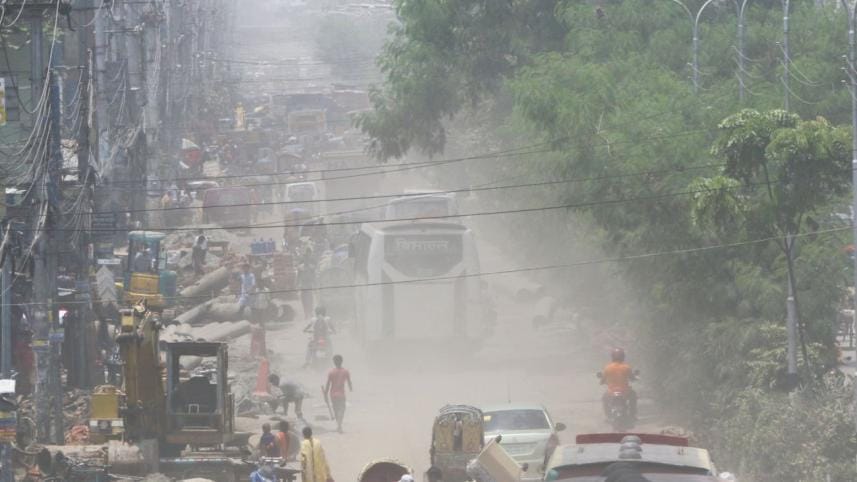Take steps to control road dust in winter: Activists

Green activists have asked the authorities concerned to take monitoring initiatives to check dust pollution in Dhaka city as its air quality is set to fall with the onset of dry season.
"It's time for the Department of Environment (DoE) to take a proper plan and strengthen its monitoring system to check dust pollution in the city. Otherwise, the city dwellers will have to suffer a lot due to the uncontrolled dust pollution," general secretary of Poribesh Bachao Andolan (Poba) Engr Abdus Sobhan told UNB.
Road dust has become the biggest source of pollution in the capital, especially during the dry season for various reasons, including unplanned construction works, posing a severe health threat to the city dwellers.
Citing his independent assessment on the city's dust pollution, Sobhan said the air pollution, caused by construction work-related processes like concrete crushing, cement batching and road stone plants, is destroying the environment and clean air, depriving the city dwellers of breathing in fresh air.
He said a household in the city, on average, has to incur a loss of additional Tk 4,000-Tk 5,000 per month due to dust pollution as the city households have to spend money on cleaning up their cloths, utensils, furniture and other materials.
A DoE study shows the dust pollution in Dhaka city turns acute during the dry season, which is over three times higher than the permissible level.
According to the study report, the level of particulate matter (PM-10), commonly known as dust, was the highest 499 ugm/m3 in the last dry season in Dhaka, while the permissible level is 150 ugm/m3 as set in the Environment Conservation Rules 1997.
The DoE with support from the Norwegian Institute for Air Research (NIAR) conducted a study in Dhaka city last year to assess the level of air pollution and define the sources of the pollution to take effective measures to check it.
The study findings reveal that the major sources of dust pollution are brick kilns (58 percent) located in surrounding areas of the city, construction materials (18 percent) and vehicles (10 percent).
Bangladesh Poribesh Andolan (Bapa) general secretary Abdul Matin said dust pollution turns acute in the mega city for lack of coordination among the urban agencies like Rajuk, city corporations and Dhaka Wasa, in implementing development projects.
As quality is not ensured in road repair, he said, city roads got damaged fast and generate unusual dust making the lives of city dwellers miserable.
Noting that the government must come up with a detailed plan on how to check dust pollution in Dhaka and other cities, Matin said public awareness is also a must and the government must shows its seriousness in this regard.
Talking to UNB, DoE additional director general Quazi Sarwar Imtiaz Hashmi said the department has already published advertisements in newspapers on sound and air pollution to make the city dwellers aware of these pollutions.
"We've also started conducting drives against polluters, who generate dust polluting the air, aiming to check air pollution in the capital," he said.
Hashmi said the DoE will soon hold a meeting with relevant stakeholders to find a way on how air and dust pollution could be checked in the capital.



 For all latest news, follow The Daily Star's Google News channel.
For all latest news, follow The Daily Star's Google News channel.
Comments